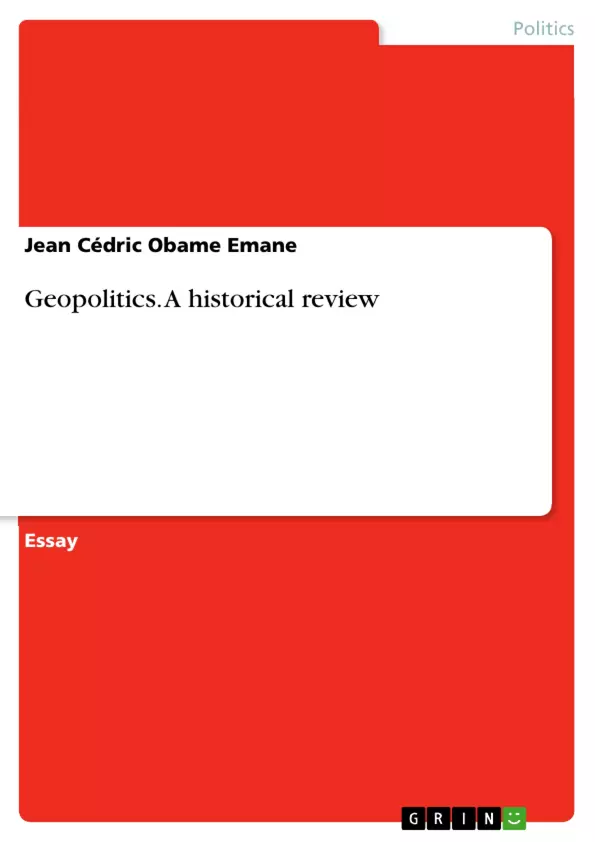To begin with, we would like to highlight that doing research on geopolitics has brought us to go deeper into a certain literature that enabled us to understand from the very beginning what geopolitics was meant for. The literature we have used consists of two categories, books relative to the latest changes on the discipline; we mean geopolitics in the present. The other literature is concerned with books of the 1990s with some authors like Ó Tuathail, Dalby and others, books that give a historical perspective of geopolitics. Furthermore, we believe that for a discipline like geopolitics that we have never studied in our previous university studies, we did not just need to make a good assignment and that is all, but also to acquire tools that might help us to be knowledgeable in that coursework. For this reason, we needed to read books that analyze and explain what the essence of geopolitics is. Our basic thesis statement is that the geographical conditions of a country, this is to say that its endowment in natural resources can have an impact on its geopolitical orientation, which is its foreign policy. In other words, geographical conditions influence a country’s foreign policy or attitude in international affairs. This we will provide an example with Gabon, our home country.
Inhaltsverzeichnis (Table of Contents)
- Introduction
- A historical review of geopolitics
- Classical geopolitics
- Is there an imperialist geopolitics?
- German imperialist geopolitics
- Ideological geopolitics
- Geopolitical doctrines
- Geopolitics after the cold war
- Geopolitics today and Gabon's geopolitics
- Conclusion
- Another aspect: Gabonese geopolitics
Zielsetzung und Themenschwerpunkte (Objectives and Key Themes)
The aim of this work is to explore the relationship between geographical conditions and a country's geopolitical orientation, focusing on the case of Gabon. The author draws on a range of literature, both contemporary and historical, to understand the evolution of geopolitics as a discipline and its relevance in the modern world.
- The influence of geographical conditions on a country's foreign policy
- The evolution of geopolitics as a discipline
- The role of power in international affairs
- The critical analysis of traditional geopolitical interpretations
- The impact of geographical factors on national behavior
Zusammenfassung der Kapitel (Chapter Summaries)
- Introduction: Introduces the research topic, highlighting the importance of understanding the relationship between geography and politics, particularly in the context of Gabon. It outlines the author's approach and research methods.
- A historical review of geopolitics: Provides an overview of the historical development of geopolitics, exploring its origins and evolution over time. The author discusses the contributions of key figures and schools of thought.
- Classical geopolitics: Focuses on the traditional perspective of geopolitics, highlighting the influence of geographical factors on national power and the strategies employed by states in international relations. It also introduces the concept of "lebensraum" as a driving force behind German imperialism.
- Is there an imperialist geopolitics?: Explores the relationship between geopolitics and imperialism, examining the ways in which geographical considerations have been used to justify expansionist policies.
- German imperialist geopolitics: Specifically examines the geopolitical strategies employed by Germany during the first half of the 20th century, highlighting the role of "lebensraum" in Nazi ideology and the consequences of this approach for international relations.
- Ideological geopolitics: Explores the ways in which geopolitical thought has been influenced by ideologies, examining the role of nationalism, imperialism, and other ideological frameworks in shaping international relations.
- Geopolitical doctrines: Discusses key geopolitical doctrines and theories, including the Heartland Theory and the Rimland Theory, and their implications for global power dynamics.
- Geopolitics after the cold war: Examines the evolution of geopolitics in the post-Cold War era, considering the rise of new actors, emerging challenges, and the changing dynamics of power in a multipolar world.
- Geopolitics today and Gabon's geopolitics: Focuses on contemporary geopolitical issues and their impact on Gabon, exploring the country's strategic position, its natural resources, and its role in regional and international affairs.
Schlüsselwörter (Keywords)
The keywords that encapsulate this work include geopolitics, geographical conditions, foreign policy, international relations, imperialism, lebensraum, critical geopolitics, classical geopolitics, Gabon, and power dynamics. These terms highlight the core concepts and themes explored within the study, providing insight into the author's focus and the disciplinary framework within which the research is conducted.
Frequently Asked Questions
How do geographical conditions influence a country's foreign policy?
Geographical factors like natural resource endowment, location, and climate shape a nation's strategic interests and its interactions with other states in international affairs.
What is the difference between classical and critical geopolitics?
Classical geopolitics focuses on how geography dictates national power, while critical geopolitics analyzes how political ideas and discourse shape our understanding of geographical space.
What was the concept of "Lebensraum" in German geopolitics?
"Lebensraum" (living space) was a doctrine used to justify imperialist expansion, suggesting that a nation's survival depends on the acquisition of more territory.
What are the "Heartland" and "Rimland" theories?
These are geopolitical doctrines that identify specific strategic areas of the world (like Central Asia or coastal regions) as key to achieving global dominance.
How does the case of Gabon illustrate geopolitical principles?
As a country rich in natural resources, Gabon's geopolitical orientation is heavily influenced by the management and export of these resources and its strategic position in Africa.
- Citar trabajo
- Jean Cédric Obame Emane (Autor), 2016, Geopolitics. A historical review, Múnich, GRIN Verlag, https://www.grin.com/document/416242



